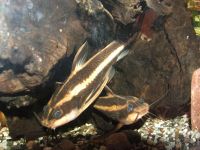Striped Raphael Catfish (Platydoras costatus)
From The Aquarium Wiki
Platydoras costatus
132 Litres (35 US G.)
15.2-20.3cm (6-8 ")
Freshwater
6.0 - 7.5
22.8-30°C (73 -86 °F)
2-20 °d
1:1 M:F
8-12 years
Family
Doradidae
Contents
Additional names
Sexing[edit]
- Male might have more larger pectoral fin spines while female shows broader body.
Tank compatibility[edit]
- The Striped Raphael Catfish are generally peaceful fish although should not be kept with very small fish or fry.
Diet[edit]
- They will accept a wide range of foods including sinking pellets and flake as well as live/frozen foods. In the wild they mostly eat invertebrates.
Feeding regime[edit]
- It is good to feed them after the lights are gone off since they are nocturnal.
Environment specifics[edit]
- Must be provided with hiding places such as caves or pipes and dim lighting. Be careful with exposed heaters as this fish can try and hide behind them and get burnt. Place plants in pots to avoid uprooting. Some floating plants are good because they provide fish with shady area. Sand or gravel substrate are good choices. Couple pieces of bogwood to create hiding places for fish.
Behaviour[edit]
- They are peaceful catfish and they will often make croaking sound. They are gluttons, which makes their bellies to inflate thus making fish looks like they're sitting on top of balls. They will often bury themselves in the substrate.
Identification[edit]
- These fish's colour is brown with vanilla-coloured stripes. Often confused with Platydoras armatulus and Orinocodoras eigenmanni which has a longer snout then P.costatus. They have bony plates covering their body with rear-facing hooks. This feature makes fish hard to handle and can easily become tangled in fish nets.
Pictures[edit]
External links[edit]
- Fishbase (Mirrors:
 )
)
